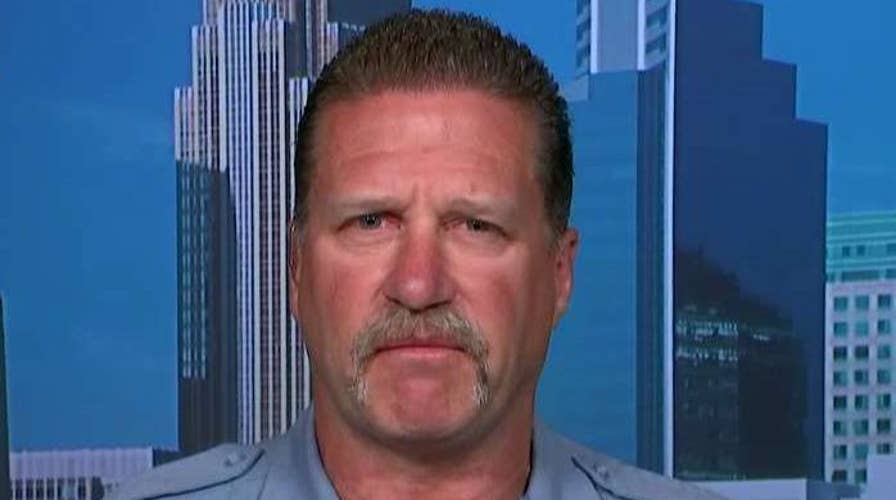Police Officers Federation accuses Minneapolis lawmakers of having anti-cop agenda amid officer shortage
Lt. Bob Kroll, president of the Police Officers Federation of Minneapolis, says the 'ultra-left' city council does not want to increase the police department amid escalating violence.
I graduated from a Georgia police academy in 1989 at the age of 19. I wasn’t even old enough to legally buy the gun I could lawfully carry as a newly-minted peace officer.
I was proud of this achievement and thoroughly enjoyed the esprit de corps with my classmates and new colleagues.
We didn’t have body cameras or many of the special tools officers have today but, for the most part, we had what we felt at the time we needed. Particularly we had overwhelming public support – or at least we felt that way.
Today, for a variety of reasons, police don’t feel they have that public support any longer. And they are right. And that’s why I wouldn’t do it again. At least not under today’s circumstances.
When I went to the police academy in 1989, I remember being taught in no uncertain terms that deadly force was authorized to stop a fleeing felon. In other words, we were told we could shoot someone who was a felon if they were running away from us. Fortunately, I was never in a position to test that training.
Police training in all subjects is now light years ahead of where it was then.
Training in the area of use of force is even further ahead in my view. Yet it is the polarizing issue of use of force that seems to most affect public perception of police officers today.
People nowadays are able to see -- collectively for the first time -- what law officers have always known: there is simply no "nice" way to arrest someone who is potentially dangerous and combative.
Today everyone has a high definition video camera at the ready and available to instantly live stream any police activity to a worldwide audience.
People nowadays are able to see -- collectively for the first time -- what law officers have always known: there is simply no "nice" way to arrest someone who is potentially dangerous and combative.
Police work can be, by its very nature, quite ugly and violent. It's never like it is on TV or in the movies. But it is real life and involves real people.
We demand that our police swear to support and defend the Constitution and laws so we must, in turn, judge them -- and their actions -- according to the Constitution and laws as interpreted by the courts.
Unlike the court of public opinion or social media, real courts and investigators don't have the luxury of picking and choosing what parts of the Constitution to apply. In fact, the law prohibits judging police actions through the 20/20 lens of hindsight – yet, via cell phone videos, that’s what happens in the court of public opinion.
In what now seems like a prophetic warning about the yet-to-be-invented cell phone video, in 1989 the Supreme Court decided that landmark case of Graham v Connor.
Graham provides that any use of force incident -- deadly or otherwise -- must be "objectively reasonable" under the totality of the circumstances and that "[t]he "reasonableness" of a particular use of force must be judged from the perspective of a reasonable officer on the scene, rather than with the 20/20 vision of hindsight.
CLICK HERE TO GET OUR OPINION NEWSLETTER
Unfortunately, this lack of public support has a way of spilling over to police management. Many officers feel their careers might be sacrificed at the altar of public opinion anytime they have to use force.
More from Opinion
In my own legal practice, I’ve seen careers and reputations ruined by defamatory “knee-jerk” press releases issued prior to any meaningful investigation into the “totality of the circumstances” surrounding a use of force incident.
Rarely, if ever, are knee jerk decisions helpful – particularly if based on a single video or social media post.
If you consider most any cell phone video of police use of force against the backdrop of a pop culture that includes rap music with titles like “F**k The Police” and lyrics such as: “We need to … kill cops. Plus stupid, ya stupid, I hope you rot in hell”
It isn’t hard to see why many officers (and potential recruits) might be inclined to steer away from a career in law enforcement.
CLICK HERE TO GET THE FOX NEWS APP
Law enforcement is a public service performed by men and women willing to put the best interests of the public ahead of their own. They may be able to live with the low pay, missing holidays with family, or working long inconvenient hours. But in my experience, many just can’t see their way clear to doing the job without public support and nobody wants to work a job where they are not appreciated.
I know I don’t. And that’s why I wouldn’t do it again.

